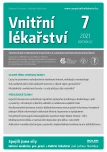In general medicine surplus of care can harm the patients
Authors:
Luboš Kotík
Authors‘ workplace:
Interní klinika, Fakultní Thomayerova nemocnice Praha
Published in:
Vnitř Lék 2021; 67(7): 394-398
Category:
Main Topic
Overview
Article brings several chosen topics, where in therapy and diagnostic would less be more, that are very often dealt by so called generalists, experts with broad knowledge in medicine. Those are first of all internists and general practitioners.
Keywords:
Pulmonary embolism – proton pump inhibitors – anticoagulation – biomarkers of inflamation – pharmocological interactions – polypramasia
Sources
1. American Society of Health‑System Pharmacists. Five Things Physicians and Patients Should Question. Choosing wisely, Released June 1, 2017; #1, 3 & 4 updated June 20, 2019. www: https://choosingwisely.org/societies/american‑society‑of‑health‑system‑pharmacists/
2. Cook D, Guyatt G. Prophylaxis against Upper Gastrointestinal Bleeding in Hospitalized Patients. N Engl J Med 2018; 378 : 2506–2516, DOI: 10.1056/NEJMra1605507.
3. Nigam H Shah, Paea LePendu. Proton Pump Inhibitor Usage and the Risk of Myocardial Infarction in the General Population Published: June 10, 2015, Plos One. https://doi. org/10.1371/journal.pone.0124653 DOI: 10.1371/journal.pone.0124653.
4. Amit S Chitnis, Stacy M Holzbauer et al. Epidemiology of Community‑Associated Clostridium difficile Infection 2009, Through 2011. JAMA Intern Med 2013; 173(14): 1359 – 1367. doi:10.1001/jamainternmed.2013.7056.
5. Shao YHJ, Chan TS, Tsai K, Wu SY. Association Between Proton Pump Inhibitors and the Risk of Hepatocellular Carcinoma. Aliment Pharmacol Ther. 2018; 48(4): 460–468.
6. Antoniou T, Macdonald EM et al. Proton pump inhibitors and the risk of acute kidney injury in older patients: a population based cohort study. CmajOpen, doi: 10.9778/ cmajo.20140074 cmajo April 16, 2015 vol. 3 no. 2 E166–E171.
7. Yan Xie, Bowe M et al. Estimates of all cause mortality and cause specific mortality associated with proton pump inhibitors among US veterans: cohort study. BMJ 2019; 365:l1580, doi:.org/10.1136/bmj.l1580 (Published 30 May 2019).
8. Savarino V, Dulbecco P et al. The appropriate use of proton pump inhibitors (PPIs): Need for a reappraisal. Eur. J. of Internal Med., DOI: http://dx.doi.org/10.1016/j.ejim. 2016. 10. 007.
9. Lee CT, McDonald EG. Deprescribing Proton Pump Inhibitors: Overcoming Resistance. JAMA Intern Med. Published online February 24 : 2020. doi:10.1001/jamainternmed. 2020.0040.
10. Green AR, Aschmann H et al. Assessment of Patient‑Preferred Language to Achieve Goal‑Aligned Deprescribing in Older Adults. JAMA Netw Open 2021; 4(4): e212633. doi:10.1001/jamanetworkopen.2021.2633.
11. Klok FA, Huisman MV. How I assess and manage the risk of bleeding in patients treated for venous thromboembolism. Blood (2020) 135 (10): 724–734. https://doi.org/10.1182/ blood.2019001605.
12. Hoirisch‑Clapauch S, Nardi AE. Antidepressants: bleeding or thrombosis? Trombosis research. September 01 2019; 181 (Supplement 1): S23–S28. DOI:https://doi.org/10.1016/ S0049-3848(19)30362-7.
13. De Filette J, Cichiels V. Bleeding interaction between fluconazole and warfarin. Lancet Published: September 29 : 2018. DOI:https://doi.org/10.1016/S0140-6736(18)32217-7.
14. Villanueva C, Colomo A, et al. Transfusion Strategies for Acute Upper Gastrointestinal Bleeding. N Engl J Med 2013; 368 : 11–21 January 3, 2013DOI: 10.1056/NEJMoa1211801.
15. Soylemez W, Schwarts LM, Woloshin S. Time Trends in Pulmonary Embolism in the United States Evidence of Overdiagnosis. Arch Intern Med. 2011; 171(9): 831–837. doi:10.1001/archinternmed.2011.178.
16. Diffin DC, Leyendecker JR, Johnson SR. Effect ofAnatomic Distribution of Pulmonary Emboli on Interobserver Agreement in the Interpretation of Pulmonary Angiography AJR1998 : 171 : 1085
17. Baumgartner C, Tritschler T. Clinical significance of subsegmental pulmonary embolism: An ongoing controversy. Rpth, First published: 09 December 2020, https://doi. org/10.1002/rth2.12464
18. Chandrashekara T. C‑reactive protein: An inflammatory marker with specific role in physiology, pathology, and diagnosis IJRCI. 2014; 2(S1): SR3.
19. Nora D, Salluh J et al. Biomarker‑guided antibiotic therapy–strengths and limitations. Ann Transl Med. 2017 May; 5(10): 208. doi: 10.21037/atm.2017. 04. 04.
Labels
Diabetology Endocrinology Internal medicineArticle was published in
Internal Medicine

2021 Issue 7
-
All articles in this issue
- Co přinášejí pro klinickou praxi mezinárodní aktivity Less is more a Choosing wisely?
- Ways to make the right decisions in internal medicine and some specialized fields
- In general medicine surplus of care can harm the patients
- Metabolic and endocrine diseases – is our approach always rational?
- Expert consensus on the practical aspects of the cooperation of cardiologist and diabetologist in the management of the patients with chronic heart failure and reduced ejection fraction
- Cardiovascular prevention: early and consistent prevention versus late intervention, complex approach to the treatment of modifiable risk factors: hypertension and dyslipidemia
- Hereditary hemorrhagic telangiectasia (Osler‑Weber‑Rendu syndrome) – Part II. Pharmacological therapy and international guidelines for the therapy 2020
- Appropriate and inappropriate therapies of implantable cardioverter‑defibrillators
- First zero contrast PCI guided by intracoronary ultrasound in the Czech Republic
- Internal Medicine
- Journal archive
- Current issue
- Online only
- About the journal
Most read in this issue
- Hereditary hemorrhagic telangiectasia (Osler‑Weber‑Rendu syndrome) – Part II. Pharmacological therapy and international guidelines for the therapy 2020
- Appropriate and inappropriate therapies of implantable cardioverter‑defibrillators
- First zero contrast PCI guided by intracoronary ultrasound in the Czech Republic
- Metabolic and endocrine diseases – is our approach always rational?
